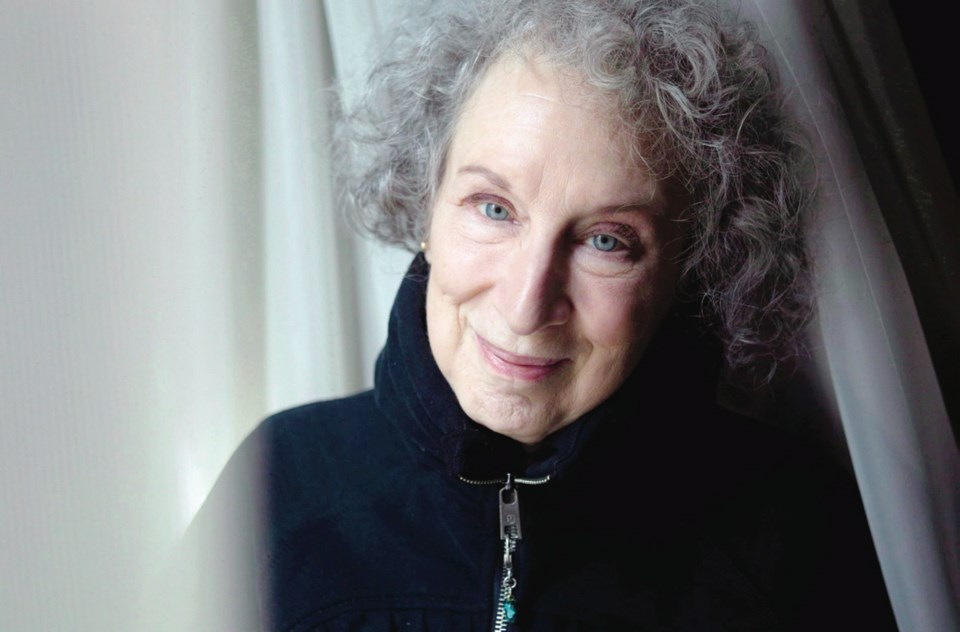A no-nonsense type, Margaret Atwood soon cut to the chase. As our conversation concluded, the Toronto novelist wanted confirmation her public appearance at Alix Goolden Hall next Saturday would be touted.
“So, I’m coming to Victoria. That’s part of what you’re going to say,” Atwood said recently, sounding … well, decidedly no-nonsense.
The grand dame of Canadian literature needn’t have worried. All 800 tickets to the event, sponsored by Munro’s Books, have sold out.
Atwood, 73, will chat about her new novel MaddAddam and read selections. She’ll then be interviewed by Munro’s manager Jessica Walker before fielding audience questions and signing books.
MaddAddam (394 pages, McClelland & Stewart) is the final instalment of Atwood’s dystopian trilogy. The others are Oryx and Crake (2003) and The Year of the Flood (2009).
In MaddAddam — strange, perplexing, sometimes funny, sometimes brilliant — we revisit Earth after a waterless flood wreaks global devastation, killing almost everyone. There is a bioengineered humanoid species, the Crakers, who have built-in sun block, thick skin on their feet (so they don’t require shoes) and who, conveniently, turn blue when it’s time to mate.
There’s also a motley band of human survivors, rampaging monster pigs and the Painballers, described by one British reviewer as: “rogue psychopaths who found superstardom through a sport that makes Rollerball look like crown green bowling.”
It may be the end of the world, at least as Margaret Atwood knows it. But don’t worry, she feels fine.
The author of more than 40 books of fiction, poetry and essays, Atwood is — along with Nobel Prize winner Alice Munro — one of Canada’s most admired writers. Her interest in sci-fi (she prefers the term “speculative fiction”) dates back to the Handmaid’s Tale in 1985. Her novel Blind Assassin won the Man Booker Prize in 2000.
Atwood is almost frighteningly intelligent. And in interviews (which she’s said to detest) the writer can be imperious and a touch caustic.
In one notorious media encounter, Atwood, then 37, spoke with the CBC television’s Hana Gartner. In mid-stream, an exasperated Atwood asked, “Can I say something very rude?” then suggested Gartner (who’d said Atwood’s stories made her sad) would be better off reading Harlequin romances.
I’ve spoken to Atwood just once before, a decade ago, when Oryx and Crake was published. To my surprise, she was effusive and charming.
Quizzed then about her reputuation, Atwood said it might have been forged in the 1970s, when female fiction writers were subjected to patronizing questions such as: “What’s the book about and why should anybody read it?” and “Do men like you?”
This time, slotting into a long list of phone interviews, Atwood seemed more impatient and less tolerant of questions she deemed sub-par. Asked if having Grimm’s Fairy Tales in her childhood home was a big literary influence, Atwood retorted: “I’m not my own biographer. So sure. Let’s say it was a big thing. It costs nothing.”
To be fair it’s likely not fun, as a famous writer, to be asked the same questions over and over. Atwood does have a sense of humour, albeit on the dark side. MaddAddam, for example, makes reference to ChickieNobs, chicken-like apparitions with no eyes or beaks bred to produce tubes of flesh perfect for chicken nuggets. A living snack food.
Atwood said her futuristic literary inventions are rooted in things that actually exist, or could potentially come about using current science.
She mentioned news reports about burgers being created in petri dishes for consumption. The headline in one newspaper: “Dutch scientist creates frankenburger using animal stem cells.”
“It sounds horrible,” said Atwood, sounding rather pleased at the prospect, “but it has a possible positive outcome. Less methane in the atmosphere, fewer forest clearcuts to make pasture.”
She sees MaddAddam as being in the tradition of such satirical novelists as George Orwell and Jonathan Swift. And there’s Samuel Beckett who is “funny and horrible all at the same time.”
Her humour is “pretty Canadian as well. Canadians do make fun of just about anything,” Atwood added.
Because we lack political power?
“I think it’s because the Scots and Irish got in there at some point,” said the writer, who has Scottish ancestry.
MaddAddam may be chock full of bleak fun, but Atwood’s concern about where we’re headed to — and who’s driving the bus — is deadly serious.
At the core of her books, she says, is the theme of out-of-control corporate power.
“Kings and dukes, in English history, there was a struggle between them, which the kings ultimately won for a while,” Atwood said.
“If you think of the corporations as dukes and the governments as kings, I would say the dukes are now winning. They’re becoming laws onto themselves.”



